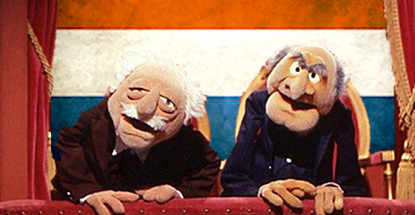 The government of the Netherlands has moved one step closer to a regulated online gambling market after presenting the Dutch Remote Gaming Bill to the House of Representatives on Wednesday. The next step on this long and winding road won’t happen until September, when those layabout politicians exit the coffee shops long enough to begin debate on the bill’s merits. Assuming that stage goes well, the bill would then proceed to the Senate with final passage expected to meet the previously stated timeline of Jan. 1, 2015.
The government of the Netherlands has moved one step closer to a regulated online gambling market after presenting the Dutch Remote Gaming Bill to the House of Representatives on Wednesday. The next step on this long and winding road won’t happen until September, when those layabout politicians exit the coffee shops long enough to begin debate on the bill’s merits. Assuming that stage goes well, the bill would then proceed to the Senate with final passage expected to meet the previously stated timeline of Jan. 1, 2015.
That said, Jan Suvyer, chairman of gaming regulator Kansspelautoriteit (KSA), doesn’t expect the first online gambling licenses to be issued until the second quarter of next year and has suggested the market will not officially launch before June 1. Operators wishing to receive a license must be registered in a European Union or European Economic Area state and must be willing to store copies of their online info in a database located within the Netherlands.
The bill has already come under fire from the Dutch Council of State, which questioned the government’s projections that a regulated online gambling market will convince around 80% of Dutch players currently patronizing internationally licensed sites to switch to operators holding Dutch licenses.
The government has responded that the KSA’s enforcement mechanisms – including payment blocking – are to be “significantly extended” to deal with any international sites that continue to serve Dutch punters post-regulation. Prior to the 2014 FIFA World Cup, the KSA sent warning letters to eight operators reminding them that continuing to market their wares to Dutch punters might negatively impact their chances of being awarded a Dutch license.
The Council of State also questioned why online operators should be given a preferential tax rate of 20% of gross gaming revenue – plus an additional 2% to fund problem gambling initiatives and the KSA’s operations – rather than the 29% slapped on brick-and-mortar gambling operators.
The tax rate has also come under fire from local online gambling advocacy body Speel Verantwoord, but because they view the rate as too high, not too low. The group argues that the 20% tax will make profits elusive for online operators, which will discourage many from applying for Dutch licenses. Speel Vertanwoord suggests a 10% rate would allow Dutch-licensed operators to offer a competitive product that would convince 95% of existing online gamblers to make the switch. But if the government insists on a 20% tax, Speel Verantwoord expects the government will achieve (at best) a 70% adoption rate.
